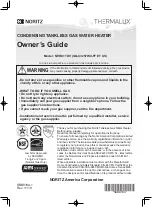
16
100352
FRESH AIR FOR
COMBUSTION
AND
VENTILATION
WARNING
This heater must have fresh air for proper operation. If
not, poor fuel combustion and improper venting of flue
gases will result. Carbon monoxide poisoning from
backed-up flue gases could occur. Read the following
instructions to insure proper fresh air for this and other
fuel-burning appliances in your home.
Today’s homes are built more energy efficient than ever. New materials, increased
insulation, and new construction methods help reduce heat loss in homes. Home
owners weather strip and caulk around windows and doors to keep the cold air out
and the warm air in. During heating months, home owners want their homes as
airtight as possible.
While it is good to make your home energy efficient, it is not good to make it too
airtight. Your home needs to breath. If your home is too airtight, fresh air has little
chance of entering in. This could be dangerous if you have fuel-burning appliances.
These appliances need fresh, outside air for proper combustion and ventilation.
Exhaust fans, fireplaces, clothes dryers, and fuel-burning appliances draw air from
the house to operate. This heater is a fuel-burning appliance. It uses air from inside
the house for combustion. It also uses this air as a draft for venting. This draft air
helps move combustion gases through the vent pipe to the outdoors. If your house
is too airtight, there is not enough fresh air for these items to use. Fresh air may
draw back into the house through venting flues and chimneys. This will keep fuel-
burning appliances from venting properly. This may cause them to release poison-
ous carbon monoxide gas into your home. It is very important to provide enough
fresh air to run all fuel-burning appliances.
DANGER
Carbon monoxide poisoning may lead to death!
Carbon monoxide is a colorless, odorless gas. Early signs of carbon monoxide
poisoning resemble the flu, with headaches, dizziness, and/or nausea. If you have
these signs, the heater may not be operating or venting properly. Get fresh air at
once! Have heater or heater venting system serviced. Some people are more
affected by carbon monoxide than others. These include pregnant women, persons
with heart and lung disease and anemia, those under the influence of alcohol, and
those at high altitudes.
















































